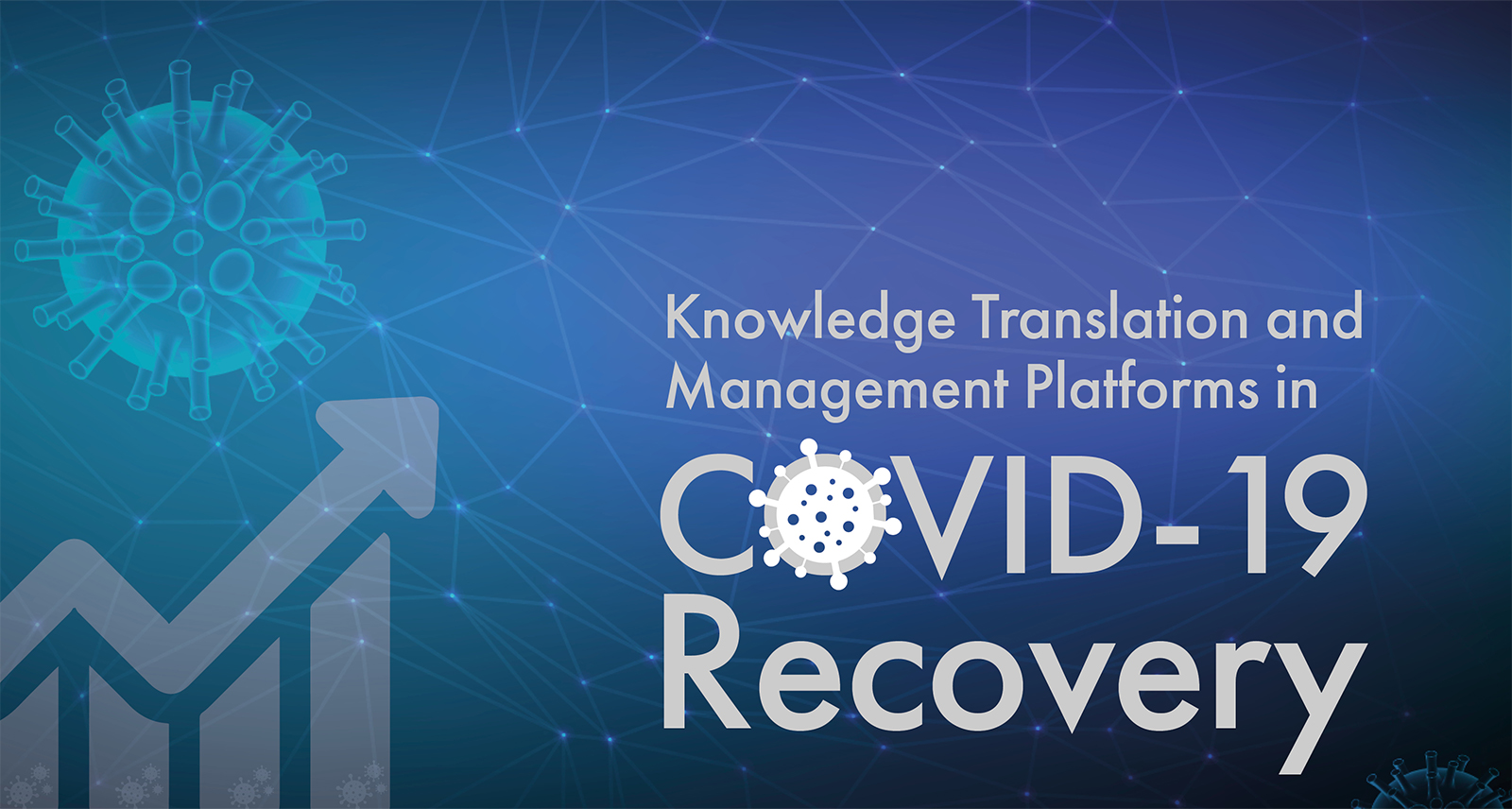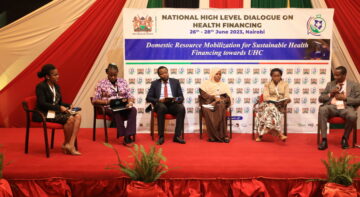Blogs

The world continues to grapple with the COVID-19 pandemic which has negatively affected almost all facets of life. In Kenya, policy-makers, communities and other actors have taken decisive action to minimize the social and economic impact of the pandemic as well as control further spread of the virus. Since independence, Kenya has been making commendable progress towards socio-economic development, gains that are now threatened by the COVID-19 pandemic.
Like in many countries, the COVID-19 crisis has drawn attention to the overburdened state of Kenya’s health sector. Evidence shows that public and private health capacities have been strained as they respond and manage the pandemic. Given the crucial role of the health sector in COVID-19 management, decision-makers and policy makers have sought solutions on how to respond, rebuild, reform, and design resilient health systems after experiencing a pandemic with such unprecedented impact. To ensure appropriate and effective responses to the evolving COVID-19 pandemic, it is important that the decisions made, and actions taken are informed by the best available evidence.
Collaborative approach to generating evidence
Towards affirming the importance of, and need for research in effective COVID-19 responses, AFIDEP, on 9 June 2021 hosted a virtual symposium with the theme ‘Building Resilient Health Systems: Tapping into Research Evidence to Support National Recovery from COVID-19 Pandemic.’ The symposium was part of the 11th KEMRI Annual Scientific and Health (KASH) conference that took place between 8 – 10 June 2021.
KASH is an annual forum that brings together research scientists, health professionals, students undertaking scientific and health related causes (diploma, graduate and postgraduate level), KEMRI staff and partners from academia, policy and industry.
The symposium built on previous similar workshops and webinars on tackling the COVID-19 pandemic challenges. Specifically, the symposium focused on adopting a collaborative approach in undertaking rapid research synthesis to influence policy by embracing peer learning and capacity building between research evidence champions and decision/policy makers. It also sought to:
- Provide a platform for discussions between researchers and decision/policy makers, including state and non-state agencies;
- Enhance collaboration, networking and synergies between knowledge managers and policy makers in generating and sharing evidence; and
- Identify the channels through which ideas and knowledge held by researchers’ evidence and policy makers can be used in the public policy process.
The symposium kicked off with a presentation by Prof Jennifer Orwa – Deputy Director, Resource Development and Knowledge Management at KEMRI, that highlighted the knowledge translation efforts so far, including the establishment of Cochrane Kenya. While Cochrane Kenya was established in February 2021, the entity was officially launched in June 2021 during the KASH conference. Cochrane is an international network headquartered in the UK, with members and supporters from more than 130 countries, worldwide. In sub-Saharan Africa, the Kenya affiliate ranks as the fourth after South Africa, Nigeria and Cameroon in terms of the number of Cochrane contributors and the number of published Cochrane and non-Cochrane systematic reviews.
The keynote address, titled ‘Research for Health: Enhance the Value and Reduce Waste, in the context of COVID-19 Pandemic’ was delivered by the Prof Taryn Young, Executive Head of the Department of Global Health at Stellenbosch University.
Prof Taryn highlighted the importance of generating and comprehensively, transparently and accurately reporting high-quality research in scientific journals. She expounded on a source of guidelines for reporting different types of research in journals (Equator network) and a framework for identifying the need for evidence review (MacMaster Forum COVID-END). Overall, Prof Taryn emphasized on the need to reduce research waste by conducting quality research and ensuring no duplication.
The symposium also featured a panel discussion moderated by Dr. Rose Oronje, Director of Public Policy and Communications at AFIDEP. The panelists – Dr. Joyce Wamicwe (MoH), Dr. Lubano Kizito (KEMRI), Prof. Julius Oyugi (UoN) and Dr. Benjamin Tsofa (Wellcome Trust), explored opportunities, capacity building needs and other interventions to improve evidence uptake in policy and practice.
Need to harmonise existing knowledge translation structures/platforms
Specific discussions touched on the role of research evidence in COVID-19 pandemic decision making, the facilitators and challenges in the process of evidence generation, synthesing and utilization as well as existing knowledge translation structures and efforts.
These [knowledge translation structures and efforts] include the Ministry of Health’s Kenya Health Research Observatory (KHRO); KEMRI’s utafiti wafya dashboard; KEMRI’s community engagement programme; AFIDEP’s evidence informed decision-making capacity building work including the Heightening Institutional Capacity for Health Research (HIGH-Res) programme; the newly launched Cochrane Kenya at KEMRI; the Center for Epidemiological Modelling and Analysis (CEMA) at the University of Nairobi; plans to establish an in-house Rapid Response Services at the Ministry of Health; and Centers for Disease Control (CDC) collaborative at KEMRI.
Discussions at the symposium revealed the need to: nurture relationships between researchers and knowledge users as a critical enabler of evidence uptake; for coordination of various knowledge translation efforts; and improve capacity for knowledge translation.
Summary of key outcomes
- There is need for increased awareness on the range of knowledge translation structures and efforts in Kenya and the implementers (MoH, KEMRI, UoN and AFIDEP).
- There is need to coordinate the range of knowledge translation structures and efforts and plans to push forward this agenda. AFIDEP was suggested as facilitator of this process alongside MoH Research and innovation Division.
- Commitment by stakeholders (MoH, KEMRI, UoN and AFIDEP) to continue conversation on how best to coordinate to ensure that the KM efforts within the health sector are well coordinated and the need to develop a working group to make this happen.
- There is need to enhance collaboration among researchers in order to dismantle the silos and reduce research wastage.
In summary, it was agreed that knowledge translation efforts need to be undertaken in a holistic manner – collaboratively, reigning in on the strengths of the various actors in the field. As part of the panel discussion, Prof. Jennifer Orwa called for AFIDEP to coordinate the range of knowledge translation structures, efforts and plans in Kenya to enhance institutions working together to produce quality research and ensuring no duplication at both the national and county levels.
Some of the planned activities as agreed upon by the HIGH-Res partners include:
- Systematic mapping of Evidence Informed Decision Making (EIDM) stakeholders and efforts in the health sector the in country.
- Establishment of EIDM coordination mechanism or Community of Practice (CoP) i.e.
- Establish a channel or platform for sharing and exchange of information, lessons and resources
- Identify relevant activities the CoP/platform should undertake, employing approaches such as:
- Promote EIDM practice in the country (expand EIDM movement)
- Discuss emerging issues/innovations in EIDM
- Conduct EIDM capacity strengthening activities/workshops
Related Posts





